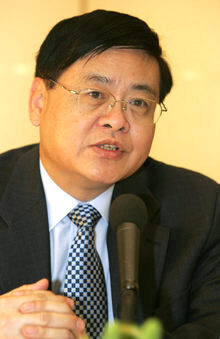hankyoreh
Links to other country sites 다른 나라 사이트 링크
Hu’s adviser says China’s N.K. policy must remain intact

"For the sake of stability on the Korean peninsula, China cannot change its North Korea policy, even if North Korea tested nuclear weapons."
So said Professor Wang Jisi, dean of the School of International Studies at Peking University and a man known as the "brain" behind Chinese President Hu Jintao’s foreign affairs decisions.
During his speech in Seoul on January 18, hosted by a Korean press society, Kwanhun Club, for its 50th anniversary event, Wang emphasized the importance of bilateral talks between North Korea and the U.S. in order to resolve Pyongyang’s nuclear crisis. He also said that China as well as the U.S. has to set as the Maginot Line a " ‘No’ to North Korea as a nuclear power and to the further spread of nuclear weapons."
Dean Wang continued that "though Washington will not tolerate North Korea as a nuclear power, the U.S. retreated its Maginot Line back as far as ’to stem the spread’ of nuclear weapons," rather than to eliminate them entirely in the North, he said.
His comments seems to mean that it became hard to push the North Korea to abolish its existing nuclear bombs after its nuclear test; therefore, the concerned nations have to focus on curbing the North from spreading its nuclear weapons and technologies instead.
After being asked to comment on Wang’s speech, an official with the Korean foreign ministry disagreed with some of its contents, saying that South Korea’s diplomatic objective is to make North Korea give up entirely its nuclear weapons and related programs.
During his speech, Wang blasted hard-liners, saying that tough sanctions could lead to a collapse of the North Korean regime and it would be China and South Korea which would have to take the full brunt of the consequences.
He added that China, along with other countries, has applied pressure on the North to give up its nuclear weapons program, but the only way that Beijing and Seoul should go forth at this moment is to urge the communist country to change its policy stance. "China keeps saying that the North’s nuclear programs are not in its own interest and the world is opposed to them and will not tolerate [Pyongyang’s export of weapons]," Wang said.
The dean said that the Bush administration of late is hoping that the six-party talks will lead to stabilization in the region. He held the Bush administration accountable for the current North Korea nuclear crisis. "In the Clinton era, the U.S. sought negotiations and was rewarded for their efforts, but under the Bush administration, the U.S. changed its policy to one of refusing direct talk with North Korea and cornering the North, which resulted in its testing of a nuclear device." Wang urged Washington to hold a one-on-one meeting with Pyongyang.
The Chinese dean dismissed some rumors that the U.S. and China will make a "big deal" to prompt a regime change in the North, saying that such plans would be "impossible." As for China-U.S. relations, he forecast that the current ties will remain intact.
Please direct questions or comments to [englishhani@hani.co.kr]
Editorial・opinion
![[Editorial] Does Yoon think the Korean public is wrong? [Editorial] Does Yoon think the Korean public is wrong?](https://flexible.img.hani.co.kr/flexible/normal/500/300/imgdb/original/2024/0417/8517133419684774.jpg) [Editorial] Does Yoon think the Korean public is wrong?
[Editorial] Does Yoon think the Korean public is wrong?![[Editorial] As it bolsters its alliance with US, Japan must be accountable for past [Editorial] As it bolsters its alliance with US, Japan must be accountable for past](https://flexible.img.hani.co.kr/flexible/normal/500/300/imgdb/original/2024/0417/6817133413968321.jpg) [Editorial] As it bolsters its alliance with US, Japan must be accountable for past
[Editorial] As it bolsters its alliance with US, Japan must be accountable for past- [Guest essay] Amending the Constitution is Yoon’s key to leaving office in public’s good graces
- [Editorial] 10 years on, lessons of Sewol tragedy must never be forgotten
- [Column] A death blow to Korea’s prosecutor politics
- [Correspondent’s column] The US and the end of Japanese pacifism
- [Guest essay] How Korea turned its trainee doctors into monsters
- [Guest essay] As someone who helped forge Seoul-Moscow ties, their status today troubles me
- [Editorial] Koreans sent a loud and clear message to Yoon
- [Column] In Korea’s midterm elections, it’s time for accountability
Most viewed articles
- 1[Column] The clock is ticking for Korea’s first lady
- 2[Editorial] When the choice is kids or career, Korea will never overcome birth rate woes
- 3[Guest essay] How Korea turned its trainee doctors into monsters
- 4[Editorial] As it bolsters its alliance with US, Japan must be accountable for past
- 5S. Korea, Japan reaffirm commitment to strengthening trilateral ties with US
- 6Korea, Japan jointly vow response to FX volatility as currencies tumble
- 7Gangnam murderer says he killed “because women have always ignored me”
- 8Japan officially says compensation of Korean forced laborers isn’t its responsibility
- 9[News analysis] After elections, prosecutorial reform will likely make legislative agenda
- 10‘Right direction’: After judgment day from voters, Yoon shrugs off calls for change